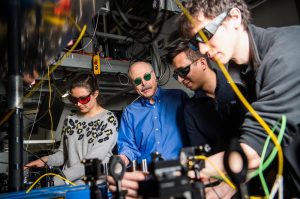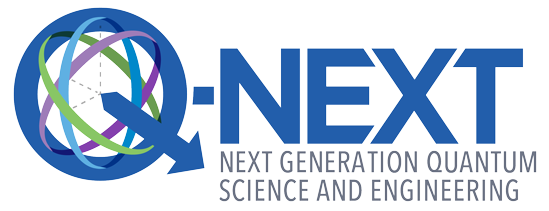Collaboration
Industry, academia and the national labs

Quantum problems are diverse and multifaceted, and it takes an equally diverse set of researchers and facilities to tackle them. Just as quantum systems are fundamentally different than their traditional counterparts, solving quantum-related challenges requires a new approach that is broader and more interconnected. By uniting scientists and engineers in diverse disciplines under one umbrella, Q-NEXT fosters a fruitful environment for advancing quantum information science.
Q-NEXT members are leaders in the physics and chemistry of quantum systems, material processing and device design, quantum simulations and architectures, and algorithms and programming, and our research spans fundamental science, devices, systems, prototypes, and applications.
There is growing industry interest in quantum information science from a wide range of sectors, including energy, communications, chemical engineering, pharmaceuticals, financial services, aerospace, logistics, and transportation. Companies want to stay informed of key developments so they can stay ahead of the competition.
By integrating industry, academia, and the national labs in every level of the organization, Q-NEXT creates bridges between them, providing each with resources and capabilities that would not otherwise be available to them. Close collaboration enhances the center’s effectiveness in developing transformative technologies with commercial applications and transferring them to industry to benefit the U.S. economy.
Guiding Q-NEXT activity will be a technology roadmap, developed by Q-NEXT members, that outlines the research and scientific discoveries needed for the distribution of quantum entanglement, especially for impactful progress in quantum computing, communications and sensing, on a 10-to 15-year timescale. The roadmap will also help inform the growth of a national quantum ecosystem.
Careers for the next generation

The quantum technologies of the future will need scientists and engineers — in training now — to build, program and maintain them. As we learn more about quantum materials, quantum scientists will be needed to harness this barely tapped potential. Q-NEXT partners provide some of the very first and few available training and hands-on experiences.
Q-NEXT is creating new programs that take advantage of the breadth of its partnerships and give students the opportunity to learn in an environment lies at the intersection of the national labs, academic, and industry. The close collaboration between these Q-NEXT partners provides new opportunities to train the next generation of U.S. scientists and engineers.
Q-NEXT programs may pair Q-NEXT university students with academic and industry mentors to give them practical experience working with industrial scientists on quantum information problems. The center also leverages degree and certificate programs that have been created within the Q-NEXT partner network and use best practices from these programs to inform our plans to train a wider student body.
Partners in Q-NEXT and the Chicago Quantum Exchange are also building a more inclusive quantum workforce through the Open Quantum Initiative, a group focused on building a diverse quantum ecosystem. A key effort is the creation an undergraduate fellowship program whose aim is to advance career and research opportunities for members of racial and ethnic groups historically underrepresented in the field of quantum science. The OQI Fellowshp targets outstanding undergraduate students early in their quantum careers to gain research experiences and build professional networks.
Other successful programs include academic degrees that are specific to quantum science, as well as programs like the Certificate in Quantum Science and Engineering developed at the Chicago Quantum Exchange, to help existing researchers with a good fundamental base of scientific knowledge reapply that knowledge to quantum systems.
